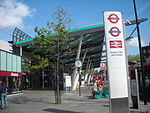New Beacon Books
1966 establishments in EnglandBlack British culture in LondonBlack British mass mediaBook publishing companies of the United KingdomBookshops in London ... and 8 more
Bookstores established in the 20th centuryBritish companies established in 1966Caribbean Artists MovementCaribbean literatureHarv and Sfn no-target errorsIndependent bookshops of the United KingdomPublishing companies based in LondonPublishing companies established in 1966

New Beacon Books is a British publishing house, bookshop, and international book service that specializes in Black British, Caribbean, African, African-American and Asian literature. Founded in 1966 by John La Rose and Sarah White, it was the first Caribbean publishing house in England. New Beacon Books is widely recognized as having played an important role in the Caribbean Artists Movement, and in Black British culture more generally. The associated George Padmore Institute (GPI) is located on the upper floors of the same building where the bookshop resides at 76 Stroud Green Road, Finsbury Park, London.
Excerpt from the Wikipedia article New Beacon Books (License: CC BY-SA 3.0, Authors, Images).New Beacon Books
Stroud Green Road, London Stroud Green (London Borough of Haringey)
Geographical coordinates (GPS) Address Nearby Places Show on map
Geographical coordinates (GPS)
| Latitude | Longitude |
|---|---|
| N 51.568 ° | E -0.1096 ° |
Address
Q&T Vietnamese Kitchen
Stroud Green Road
N4 3EF London, Stroud Green (London Borough of Haringey)
England, United Kingdom
Open on Google Maps








